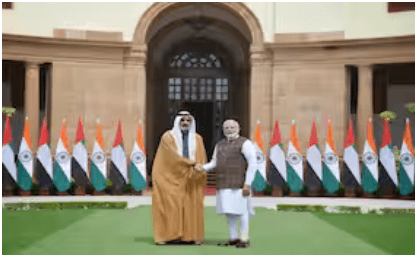UAE and India have taken significant strides in strengthening their bilateral relationship by signing four key agreements in the energy sector.
These agreements reflect the deepening cooperation between the two nations, aiming to enhance energy security, sustainability, and economic development. As both countries face the pressing global need for energy diversification and security, this collaboration highlights their shared commitment to finding innovative solutions to the challenges posed by climate change and the evolving energy landscape.
The agreements were signed during a high-level delegation visit from India to the UAE, underscoring the importance both nations place on this partnership. The focus of the agreements spans various aspects of energy, including renewable energy, oil and gas, and joint investments in sustainable energy projects. The collaboration not only strengthens economic ties between the two countries but also contributes to the global efforts in combating climate change by promoting cleaner and more sustainable energy solutions.
One of the most critical agreements signed pertains to the exploration and development of oil and gas fields. India, being one of the world’s largest energy consumers, has been looking to diversify its energy sources and reduce its dependence on oil imports from other regions. The UAE, with its vast reserves of oil and gas, has long been a key player in the global energy market. This agreement will allow Indian energy companies to participate in the exploration and production of oil and gas in the UAE, giving India greater access to secure energy supplies while allowing the UAE to benefit from India’s growing energy demand.
This partnership also extends to renewable energy, where both countries are making significant investments. With the global energy transition moving toward cleaner alternatives, the UAE and India have recognized the importance of developing sustainable energy sources. One of the agreements focuses on collaboration in the field of solar energy. India, which has vast potential for solar power generation, has already been making significant strides in expanding its solar energy capacity. The UAE, on the other hand, has been investing heavily in renewable energy projects as part of its strategy to reduce its dependence on fossil fuels. The partnership between the two nations will see joint investments in solar energy projects, technology sharing, and capacity building, contributing to both countries’ renewable energy goals.
Another crucial aspect of the agreements is related to clean energy research and development. Both the UAE and India are committed to developing innovative technologies to reduce their carbon footprints. The agreement in this area focuses on the sharing of knowledge and expertise in areas such as carbon capture and storage, hydrogen energy, and energy efficiency. By collaborating on research and development, the two countries aim to accelerate the adoption of clean energy technologies that can help them meet their climate goals while also ensuring long-term energy security.
In addition to the technical and economic benefits of these agreements, they also have broader geopolitical implications. India and the UAE have long shared a close diplomatic relationship, and this deepening energy partnership further solidifies their ties. As global energy markets continue to evolve, having strong bilateral relationships is crucial for securing stable energy supplies. For India, this partnership with the UAE represents a significant step toward energy independence, while for the UAE, it enhances its position as a reliable energy partner on the global stage.
The agreements also reflect the UAE’s vision of becoming a global leader in energy innovation. As part of its long-term strategy, the UAE has been working to diversify its economy and reduce its reliance on oil revenues. The country’s leadership has recognized the importance of investing in the future of energy, particularly in renewable sources such as solar and wind power. By partnering with India, the UAE can leverage India’s growing energy needs and expertise in renewable energy to further its own goals of becoming a hub for clean energy solutions.
Stay Connected: ”Your Source for the Latest News Updates”





